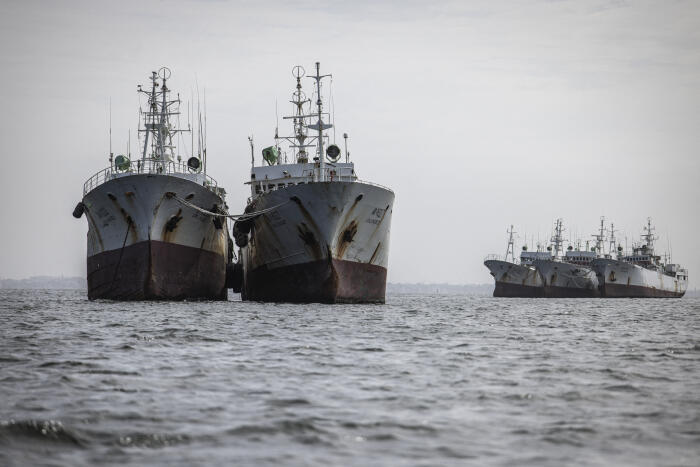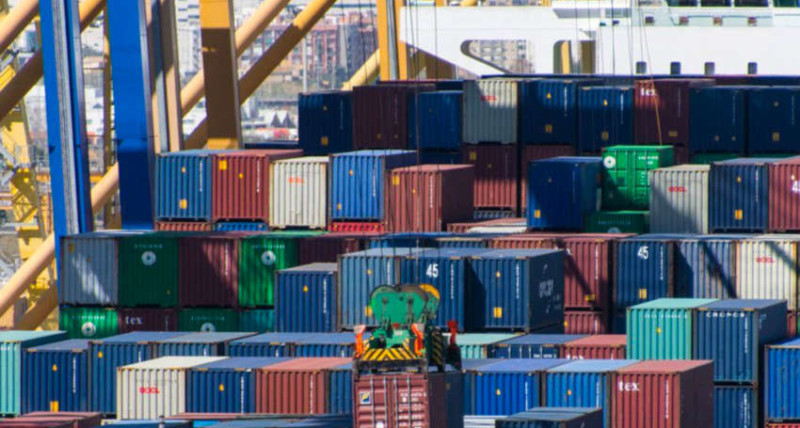Trawlers, particularly Chinese, which pass under the Senegalese flag or which sail without real traceability at sea, are accused of “looting” fish stocks.
Of all the promises of rupture made by the new authorities of Senegal, this one directly concerns the daily lives of 600,000 of their compatriots. Before coming to power, new President Bassirou Diomaye Faye and his Prime Minister Ousmane Sonko were committed to restoring the food sovereignty of the Senegalese.
In control since April 3, the former opponents have taken first steps to change the situation in the industrial fishing sector and are leading a fight on a double front: renegotiating by the end of November the only existing agreements with the European Union and its nineteen vessels authorized to fish in local waters; but above all to attack these foreign trawlers, Chinese and Turkish, which, by passing under the Senegalese flag, free themselves from more restrictive rules applied to European vessels.
Article reserved for our subscribers
Symbols of overfishing off the Senegalese coast, these Chinese Yuan Yu trawlers, stranded in Dakar for weeks, appeared after the rapprochement between the two countries in 2005, without any agreement in the field of fishing. is not signed. These ships, whose registration means “distant fishery” in Mandarin, have since invaded the coast.
The charterers hide behind mixed companies under Senegalese law, today in the crosshairs of the government. At the beginning of May, the expected publication of licenses granted to “national” vessels revealed, according to high-level sources in the sector, the presence of “at least 46 Chinese boats” in territorial waters.
Large-scale audit announced in the fishing sector
“I have photographed dozens of these Chinese boats between Dakar and Gorée since the start of the year,” confirms Mamadou Sarr. The fisherman has little doubt about their intentions. “They come here to senegalize their boats,” thunders the man who is also at the head of the coalition for sustainable fishing. They obtain new registration by setting up joint companies with Senegalese nominees to plunder our resources. »
This legal process intended to allow the domiciliation of companies in Senegal, widely used in the industrial fishing sector, is today called into question by the new power which considers its primary objective diverted by these mixed companies.
As a prelude to a vast announced audit of the fishing sector, Senegal therefore published, on May 2, a document which “gives hope” to fishermen like Mamadou Sarr: a list of 132 “national vessels”, dozens of which are chartered by industrial fishing companies, 51% owned by Senegalese parties. “False noses of Chinese trawlers”, denounces Aliou Ba, head of the Ocean campaign for Greenpeace Africa.
“This first strong act for transparency”, Fatou Niang, treasurer of the group of shipowners and fishing industrialists in Senegal (Gaipes) and general director of a company at the head of 18 trawlers – all under license – was waiting for him for “at least four years”.
Navigation paths that raise questions
In May 2019, she co-signed with all representatives of the sector an open letter to President Macky Sall ordering him to publish the approvals granted to foreign buildings. Among them, around “forty ships, the majority belonging to Chinese shipowners”, accused of “plundering” fish stocks such as “sardinellas, horse mackerel as well as bottom-dwelling species such as hake”.
“The list is a good start,” recognizes Alassane Samba, a biological oceanographer who has long been attached to the Dakar-Thiaroye oceanographic research center. “We must now know who the real owners of these vessels are, know the financial arrangements and track down possible tax fraud,” lists his IRD colleague, Patrice Brehmer, also scientific advisor to the sub-regional fisheries commission. “Companies with extremely low capital are very suspicious,” he adds, evoking the likelihood of shell companies in the table revealed at the beginning of May.
In a document consulted by Le Monde Afrique, Socomi, one of the officially approved joint companies, requested the previous Minister of Fisheries from January 2023 to charter ten vessels with Chinese names. Nearly a year and a half later, none of them were sailing in the waters of Senegal, but, according to the official list, Socomi equipped ten trawlers with modified names.
Buildings whose navigation routes raise questions. According to the Global Fishing Watch fishing tracking site, the Zhenyuanyu 813, which left the Chinese port of Dalian in 2017, reappeared in 2022 off the coast of Pointe-Noire in Congo-Brazzaville before reaching Dakar a year later and operating for a few months before disappearing in November 2023; ditto for the Zhenyuyuan 823 sailing for a week between the end of March and the beginning of April from the coast of Casamance to Dakar before disappearing at sea.
“Overexploited” sardinella stocks
“All these seemingly enigmatic trajectories demonstrate that these ships can manipulate their AIS, the automatic identification system,” deciphers Bassirou Diarra of the Foundation for Environmental Justice. “We must make AIS compulsory in West Africa,” adds Patrice Brehmer. Without this traceability measure at sea, we will not be able to fight against Chinese ships. »
The week following the publication of the licenses, sanctions multiplied against one of these mixed companies: the company Baye Niass saw half of its fleet boarded at the port of Dakar by the Directorate of Protection and Surveillance of fisheries (DPSP) for “illegal fishing”. In 2023, 19 ships were boarded in the first nine months of the year according to the DPSP.
“Still too little,” judges Aliou Ba, of Greenpeace. Helped by a Falcon-50 from the French Elements of Senegal – “valuable” logistical support according to Bassirou Diarra – to characterize fishing offenses, Senegalese surveillance is struggling to cope with irregular fishing. The figures speak for themselves: “2,250 checks and/or inspections on the quayside and at sea in 2023”, or barely ten per day to control an armada of nearly 17,500 canoes and hundreds of industrial fishing vessels which cross the wide of Senegal over a year.
Comforted by the commitments of the new authorities, the fisheries services are communicating about their seizures: 30 tonnes of fry on May 10; a “big blow” in the suburbs of Dakar four days later, with “the record seizure of nearly a hundred tonnes of fish larvae”. Operations to combat overfishing highlighted while stocks, particularly of sardinella, very popular in Senegal, are “overexploited by 192%”, according to data from the Food and Agriculture Organization of the United Nations. (FAO).
“It’s a situation of collapse that threatens us,” warns Patrice Brehmer. Regarding round sardinella – one of the Senegalese’s favorite fish used for the national dish thiéboudiène – the state of resources is considered catastrophic by scientists in the region. And if nothing is done against these foreign trawlers for the next four or five years, warns Mr. Brehmer, “it is the death of the small pelagics, but of the fisheries.”




